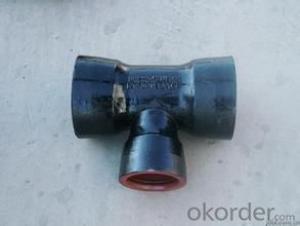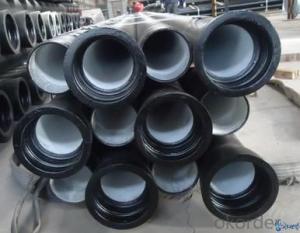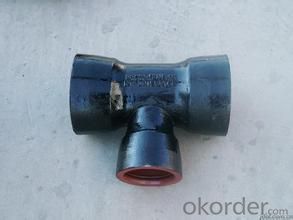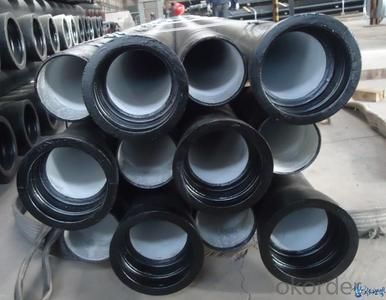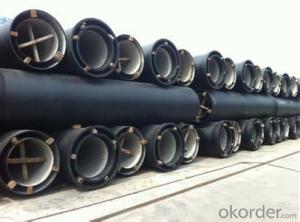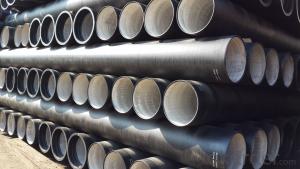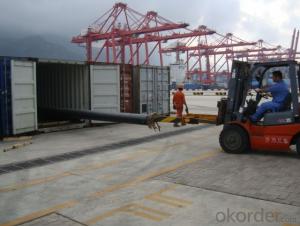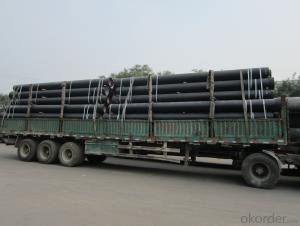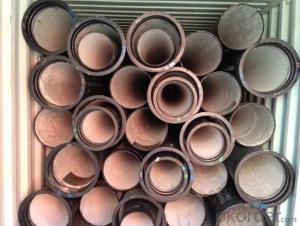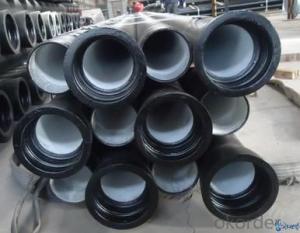DUCTILE IRON PIPESC Class DN400
- Loading Port:
- China Main Port
- Payment Terms:
- TT OR LC
- Min Order Qty:
- -
- Supply Capability:
- -
OKorder Service Pledge
OKorder Financial Service
You Might Also Like
Ductile Iron Cast Pipe is without any defects compare with tradition casting tech, which has many advantages particularly as follow:
(1) High density. In the "vertical upward casting" process, the melt iron of centre liquid column in center crystallizer is continuously feeding for volume shrinkage caused by condensation tube at outer circumference , which lead to be free of shrinkage porosity.
(2) High purity. When melt iron pouring, the mixed impurities such as gas, dross, sand grain which are lighter than melt iron could be eliminated at furnace mouth, its impossible to enter into the crystallizer through the channel, so the melt iron into the crystallizer is very pure.
(3) Strength with toughness. The cooling speed provided by continuous crystallizer is 30 times than sand casting and 5 times than centrifugal casting, and doesn't produce white iron, the eutectic cell volume of continuous cast iron is one eighth to one tenth compare with traditional cast iron. The density of graphite nodule in ductile iron can reach 300-700 pcs/mm2. Therefore, all reason above improve the strength and toughness of continuous cast iron.
(4) Free machining. The high speed cooling make the hardening phase (such as boride, steadite) not appear like reticular, massive or thick, but diffuse like fish bone and pane in shape, moreover, there are tiny graphite flakes inlaid hardening phase. It's free machining in BrinellHardness the range of 250-300HB. However, the Brinell Hardness of 250 is top limit to common metal materials.
(5) Uniform composition of tube wall. The convection mixing of liquid column caused by marching type drawing in crystallizer make the composition of tube wall well-distributed, and concentration gradient very little.
(6) High productivity. To the wall thickness of tube under 10mm, the speed of continuous casting is 1 meter/min, to the wall thickness of tube under 20mm, the speed of continuous casting is 0.5 meter/min, which is high efficiency that centrifugal or other casting tech couldn't reach.
- Q: How does ductile iron pipe perform in high-temperature environments?
- Ductile iron pipe performs well in high-temperature environments due to its superior strength and thermal resistance. It can withstand elevated temperatures without significant deformation or structural damage, making it a reliable choice for various applications requiring high-temperature resistance.
- Q: Are ductile iron pipes suitable for bridge crossings or crossings under roadways?
- Bridge crossings or crossings under roadways can be easily accommodated with ductile iron pipes. These pipes possess remarkable strength, durability, and resistance against external forces like heavy traffic loads and bridge movements. With their high tensile strength, they can endure the stress and strain caused by vehicles passing over them. Furthermore, ductile iron pipes exhibit exceptional corrosion resistance, rendering them suitable for underground installations that may come into contact with water or other corrosive elements. Additionally, their long lifespan and minimal maintenance requirements make them a dependable choice for bridge crossings or crossings under roadways. Consequently, ductile iron pipes offer a cost-effective and efficient solution for such infrastructure projects.
- Q: Can ductile iron pipes be used for both water and wastewater applications?
- Ductile iron pipes are versatile and can be utilized in both water and wastewater settings. Their durability, strength, and corrosion resistance make them appropriate for various purposes such as water distribution, sewage systems, and wastewater treatment plants. These pipes are specifically engineered to endure high pressure and effectively manage the flow of both water and wastewater. Furthermore, ductile iron pipes possess a lengthy lifespan, minimizing the necessity for frequent replacements and maintenance. This attribute renders them a cost-effective alternative for both water and wastewater applications.
- Q: Can ductile iron pipe be used for compressed air systems?
- Yes, ductile iron pipe can be used for compressed air systems. Ductile iron pipe is known for its strength, durability, and resistance to cracking, making it suitable for various applications including compressed air systems. It is capable of withstanding high pressure and is less likely to corrode or rust compared to other materials. However, it is important to ensure that the ductile iron pipe is properly sized and installed to handle the specific requirements of the compressed air system. Additionally, regular maintenance and inspection should be conducted to prevent any potential issues or damages.
- Q: Can ductile iron pipes be used for wastewater pumping stations?
- Yes, ductile iron pipes can be used for wastewater pumping stations. Ductile iron pipes are durable, corrosion-resistant, and have high tensile strength, making them suitable for transporting wastewater and withstanding the pressure and chemicals involved in pumping stations. Additionally, their flexibility allows for easy installation and maintenance in various environmental conditions.
- Q: What is the maximum temperature that ductile iron pipe can handle?
- The ability of ductile iron pipe to withstand high temperatures varies depending on factors such as the grade of ductile iron, the length of time exposed to heat, and the presence of external factors like corrosive environments. In general, ductile iron pipes can tolerate temperatures up to 400-450 degrees Fahrenheit (204-232 degrees Celsius) for short periods. However, it is crucial to refer to the manufacturer's specifications and guidelines to determine the exact maximum temperature limits for a specific grade of ductile iron pipe. Additionally, it is advisable to consider the consequences of thermal expansion, potential loss of mechanical properties, and any additional protective measures that may be necessary when operating at elevated temperatures.
- Q: Deep well spiral iron pipe, or ductile iron tube?
- Ductile iron pipe is a kind of cast iron pipe. In quality, the spheroidization of cast iron pipes is controlled to be 1-3 (spheroidization rate 80%), so the mechanical properties of the cast iron pipes, ductile iron pipes and finished product libraries can be better improved, with the nature of iron and the properties of steel. Ductile cast iron pipe after annealing, the microstructure is ferrite and pearlite, good mechanical properties, excellent corrosion resistance, good ductility, good sealing effect, simple installation, mainly for municipal, industrial and mining enterprises, water supply, gas, oil etc..
- Q: What are the typical maintenance requirements for ductile iron pipe?
- To maintain ductile iron pipe, it is necessary to conduct regular inspections, clean the pipe, and repair any damage. Inspections play a crucial role in identifying signs of damage, corrosion, or leaks. This can be done visually or using non-destructive testing techniques such as ultrasonic or magnetic particle testing. Regular inspections are important for detecting and addressing issues before they worsen and cause significant damage. Cleaning is another essential maintenance requirement for ductile iron pipe. Over time, sediment, scale, and debris can accumulate inside the pipe, reducing its flow capacity and potentially causing blockages. Regular cleaning methods like high-pressure water jetting or mechanical cleaning can remove these deposits, ensuring optimal flow and preventing problems related to reduced flow or pressure. Repairing any damage or corrosion is crucial for maintaining ductile iron pipe. If cracks, leaks, or other forms of damage are detected during inspections, prompt repairs are necessary to prevent further deterioration and potential failure. Depending on the extent of the damage, repairs may include welding, epoxy lining, or replacement of the affected section of the pipe. In addition to these specific maintenance requirements, implementing a comprehensive maintenance program is important. This may involve preventative measures such as cathodic protection to prevent corrosion or the application of protective coatings to extend the pipe's lifespan. Overall, regular inspections, cleaning, and repairs are necessary for maintaining ductile iron pipe. Following these maintenance practices ensures the pipe's longevity, reliability, and optimal performance, reducing the risk of failures and disruptions.
- Q: How much is the installation fee of the 400 largest ductile iron pipe?
- Ductile iron pipes mainly called centrifugal ductile iron pipe, it has the properties of nature, iron and steel, excellent corrosion resistance, good ductility, good sealing effect, simple installation, mainly for municipal, industrial and mining enterprises, water supply, gas, oil etc.. Water supply pipe is the first choice, with high cost performance.
- Q: Are ductile iron pipes suitable for use in oil refineries?
- Ductile iron pipes are an excellent choice for oil refineries as they offer a unique combination of strength, durability, and flexibility. These pipes possess high tensile strength, enabling them to withstand the intense pressure and stress commonly encountered in oil refining. Their ability to transport fluids such as crude oil, refined petroleum products, and chemicals within the refinery is crucial. Furthermore, ductile iron pipes exhibit exceptional corrosion resistance, protecting them from the corrosive effects of oil, chemicals, and other substances present in oil refineries. This quality ensures the pipes' longevity and reliability, reducing the need for frequent maintenance and replacement. Moreover, ductile iron pipes possess remarkable ductility, enabling them to absorb significant impacts and vibrations without fracturing or breaking. This characteristic proves advantageous in oil refineries, considering the potential movement or stressors caused by machinery, equipment, or ground settlement. Additionally, the pipes' smooth interior surface minimizes friction, facilitating efficient fluid flow and reducing pressure loss. This feature plays a vital role in optimizing fluid transportation within oil refineries, ensuring a smooth and reliable production process. In summary, ductile iron pipes are well-suited for oil refineries due to their high tensile strength, corrosion resistance, ductility, and smooth interior surface. These pipes provide a trustworthy and long-lasting solution for fluid transportation within the refinery, contributing to the efficient and safe operation of oil refining processes.
Send your message to us
DUCTILE IRON PIPESC Class DN400
- Loading Port:
- China Main Port
- Payment Terms:
- TT OR LC
- Min Order Qty:
- -
- Supply Capability:
- -
OKorder Service Pledge
OKorder Financial Service
Similar products
Hot products
Hot Searches
Related keywords
